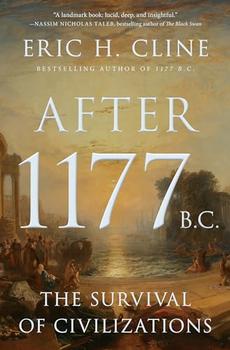
The Survival of Civilizations (Turning Points in Ancient History # 2)
by Eric H. Cline
In this gripping sequel to his bestselling 1177 B.C., Eric Cline tells the story of what happened after the Bronze Age collapsed—why some civilizations endured, why some gave way to new ones, and why some disappeared forever.
At the end of the acclaimed history 1177 B.C., many of the Late Bronze Age civilizations of the Aegean and Eastern Mediterranean lay in ruins, undone by invasion, revolt, natural disasters, famine, and the demise of international trade. An interconnected world that had boasted major empires and societies, relative peace, robust commerce, and monumental architecture was lost and the so-called First Dark Age had begun. Now, in After 1177 B.C., Eric Cline tells the compelling story of what happened next, over four centuries, across the Aegean and Eastern Mediterranean world. It is a story of resilience, transformation, and success, as well as failures, in an age of chaos and reconfiguration.
After 1177 B.C. tells how the collapse of powerful Late Bronze Age civilizations created new circumstances to which people and societies had to adapt. Those that failed to adjust disappeared from the world stage, while others transformed themselves, resulting in a new world order that included Phoenicians, Philistines, Israelites, Neo-Hittites, Neo-Assyrians, and Neo-Babylonians. Taking the story up to the resurgence of Greece marked by the first Olympic Games in 776 B.C., the book also describes how world-changing innovations such as the use of iron and the alphabet emerged amid the chaos.
Filled with lessons for today's world about why some societies survive massive shocks while others do not, After 1177 B.C. reveals why this period, far from being the First Dark Age, was a new age with new inventions and new opportunities.
"Brilliant... . A superb work to interest history buffs for every period." ―Kirkus Reviews (starred review)
"Cline distills an immense amount of material into a highly readable narrative that in its conclusion draws startling parallels with contemporary climate change. It's a dizzying feat of scholarship." ―Publishers Weekly (starred review)
"Cline mixes archaeology, history, climate science, and social theory in this insightful work that never pushes evidence beyond its weight... . [A] compelling, original, and fruitful story. This title has significant meaning in an overstressed world. For more than just history buffs." ―Library Journal (starred review)
This information about After 1177 B.C. was first featured
in "The BookBrowse Review" - BookBrowse's membership magazine, and in our weekly "Publishing This Week" newsletter. Publication information is for the USA, and (unless stated otherwise) represents the first print edition. The reviews are necessarily limited to those that were available to us ahead of publication. If you are the publisher or author and feel that they do not properly reflect the range of media opinion now available, send us a message with the mainstream reviews that you would like to see added.
Any "Author Information" displayed below reflects the author's biography at the time this particular book was published.
Dr. Eric H. Cline is Professor of Classics and Anthropology, Director of the Capitol Archaeological Institute, and former Chair of the Department of Classical and Near Eastern Languages and Civilizations at The George Washington University, in Washington DC. A National Geographic Explorer, Fulbright scholar, and NEH Public Scholar with degrees from Dartmouth, Yale, and the University of Pennsylvania, he is an active field archaeologist with more than 30 seasons of excavation and survey experience in Israel, Egypt, Jordan, Cyprus, Greece, Crete, and the United States, including ten seasons at the site of Megiddo (biblical Armageddon) in Israel and eight seasons at Tel Kabri, also in Israel, where he is currently Co-Director. Winner of the 2014 "Nancy Lapp Award for Best Popular Book" from the American Schools of Oriental Research for his book 1177 BC: The Year Civilization Collapsed, which was also considered for a Pulitzer Prize, and winner of the same award again in 2018 for his book Three Stones Make a Wall: The Story of Archaeology, he is also a three-time winner of the Biblical Archaeology Society's "Best Popular Book on Archaeology" Award (2001, 2009, and 2011). A popular lecturer who has appeared frequently on television documentaries, he has also won national and local awards for both his research and his teaching. He is the author or editor of 20 books, which have been translated into sixteen languages, as well as nearly 100 articles, and several recorded lecture courses. His previous books written specifically for the general public include The Battles of Armageddon: Megiddo and the Jezreel Valley from the Bronze Age to the Nuclear Age (2000); Jerusalem Besieged: From Ancient Canaan to Modern Israel (2004); From Eden to Exile: Unraveling Mysteries of the Bible (2007); Biblical Archaeology: A Very Short Introduction (2009); The Trojan War: A Very Short Introduction (2013); 1177 BC: The Year Civilization Collapsed (2014; revised 2021); Three Stones Make a Wall: The Story of Archaeology (2017); and, most recently, Digging Up Armageddon: The Search for the Lost City of Solomon (2020).




The single biggest problem in communication is the illusion that it has taken place
Click Here to find out who said this, as well as discovering other famous literary quotes!
Your guide toexceptional books
BookBrowse seeks out and recommends the best in contemporary fiction and nonfiction—books that not only engage and entertain but also deepen our understanding of ourselves and the world around us.